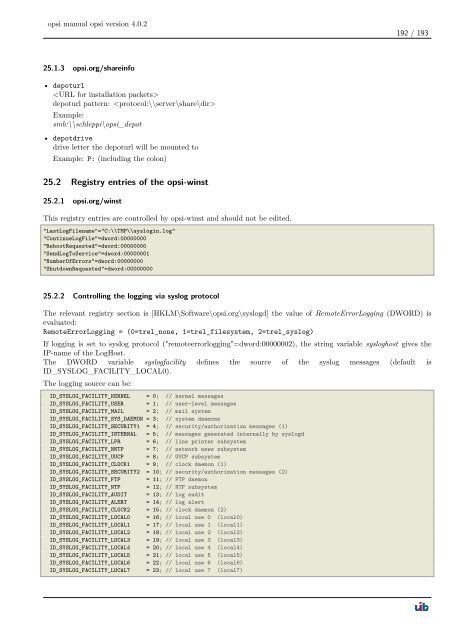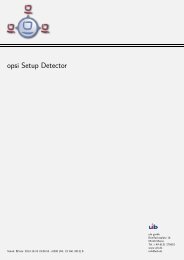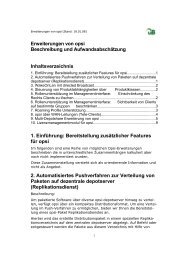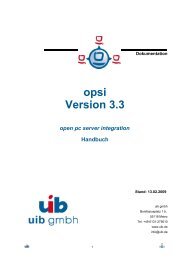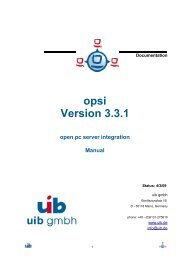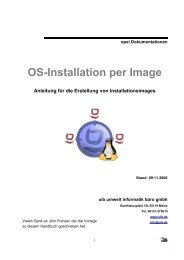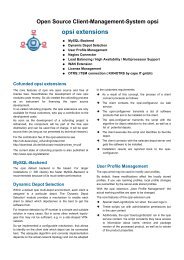opsi manual opsi version 4.0.2 - opsi Download - uib
opsi manual opsi version 4.0.2 - opsi Download - uib
opsi manual opsi version 4.0.2 - opsi Download - uib
Create successful ePaper yourself
Turn your PDF publications into a flip-book with our unique Google optimized e-Paper software.
<strong>opsi</strong> <strong>manual</strong> <strong>opsi</strong> <strong>version</strong> <strong>4.0.2</strong><br />
25.1.3 <strong>opsi</strong>.org/shareinfo<br />
• depoturl<br />
<br />
depoturl pattern: <br />
Example:<br />
smb:\\schleppi\<strong>opsi</strong>_depot<br />
• depotdrive<br />
drive letter the depoturl will be mounted to<br />
Example: P: (including the colon)<br />
25.2 Registry entries of the <strong>opsi</strong>-winst<br />
25.2.1 <strong>opsi</strong>.org/winst<br />
This registry entries are controlled by <strong>opsi</strong>-winst and should not be edited.<br />
"LastLogFilename"="C:\\TMP\\syslogin.log"<br />
"ContinueLogFile"=dword:00000000<br />
"RebootRequested"=dword:00000000<br />
"SendLogToService"=dword:00000001<br />
"NumberOfErrors"=dword:00000000<br />
"ShutdownRequested"=dword:00000000<br />
25.2.2 Controlling the logging via syslog protocol<br />
192 / 193<br />
The relevant registry section is [HKLM\Software\<strong>opsi</strong>.org\syslogd] the value of RemoteErrorLogging (DWORD) is<br />
evaluated:<br />
RemoteErrorLogging = (0=trel_none, 1=trel_filesystem, 2=trel_syslog)<br />
If logging is set to syslog protocol ("remoteerrorlogging"=dword:00000002), the string variable sysloghost gives the<br />
IP-name of the LogHost.<br />
The DWORD variable syslogfacility defines the source of the syslog messages (default is<br />
ID_SYSLOG_FACILITY_LOCAL0).<br />
The logging source can be:<br />
ID_SYSLOG_FACILITY_KERNEL = 0; // kernel messages<br />
ID_SYSLOG_FACILITY_USER = 1; // user-level messages<br />
ID_SYSLOG_FACILITY_MAIL = 2; // mail system<br />
ID_SYSLOG_FACILITY_SYS_DAEMON = 3; // system daemons<br />
ID_SYSLOG_FACILITY_SECURITY1 = 4; // security/authorization messages (1)<br />
ID_SYSLOG_FACILITY_INTERNAL = 5; // messages generated internally by syslogd<br />
ID_SYSLOG_FACILITY_LPR = 6; // line printer subsystem<br />
ID_SYSLOG_FACILITY_NNTP = 7; // network news subsystem<br />
ID_SYSLOG_FACILITY_UUCP = 8; // UUCP subsystem<br />
ID_SYSLOG_FACILITY_CLOCK1 = 9; // clock daemon (1)<br />
ID_SYSLOG_FACILITY_SECURITY2 = 10; // security/authorization messages (2)<br />
ID_SYSLOG_FACILITY_FTP = 11; // FTP daemon<br />
ID_SYSLOG_FACILITY_NTP = 12; // NTP subsystem<br />
ID_SYSLOG_FACILITY_AUDIT = 13; // log audit<br />
ID_SYSLOG_FACILITY_ALERT = 14; // log alert<br />
ID_SYSLOG_FACILITY_CLOCK2 = 15; // clock daemon (2)<br />
ID_SYSLOG_FACILITY_LOCAL0 = 16; // local use 0 (local0)<br />
ID_SYSLOG_FACILITY_LOCAL1 = 17; // local use 1 (local1)<br />
ID_SYSLOG_FACILITY_LOCAL2 = 18; // local use 2 (local2)<br />
ID_SYSLOG_FACILITY_LOCAL3 = 19; // local use 3 (local3)<br />
ID_SYSLOG_FACILITY_LOCAL4 = 20; // local use 4 (local4)<br />
ID_SYSLOG_FACILITY_LOCAL5 = 21; // local use 5 (local5)<br />
ID_SYSLOG_FACILITY_LOCAL6 = 22; // local use 6 (local6)<br />
ID_SYSLOG_FACILITY_LOCAL7 = 23; // local use 7 (local7)


